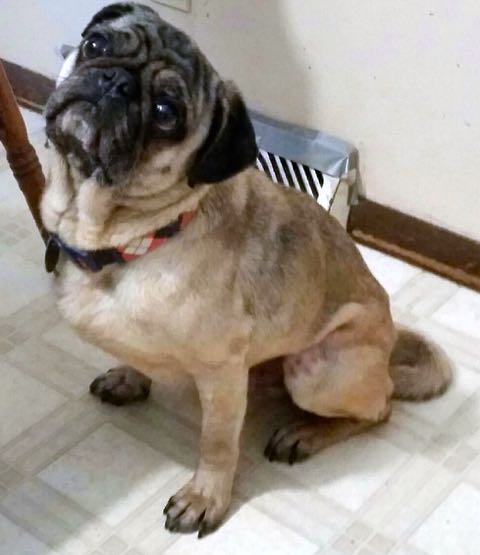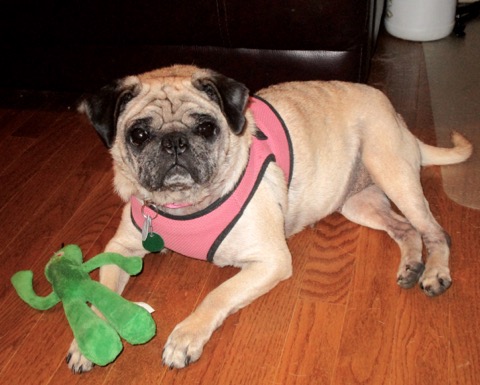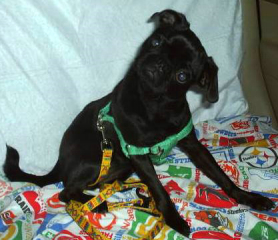 | | Bobby (2004) |
"Both the human and the dog need someone in their lives."
Senior dogs in many ways are the same as their human counterparts. Many
of the same ailments and general problems are faced by both man and dog.
One devastating problem is losing the person closest to them.
For the human senior, the loss of that lifetime mate is a tragic
experience. The loss of a lifetime owner can be equally difficult for the
canine senior. It's hard to make the adjustment to living without a
lifetime companion. Both the human and the dog need someone in their lives
and often the best decision is to put these two seniors together.
Puppies are darling and so much fun to watch at play, but they are also
a lot of work. Much like grandchildren they are best when you can choose
when to have them around and then when to send them home with their
parents. And they can be dangerous around someone who does not move
quickly any more. A senior can trip over a fast moving puppy and both can
be seriously hurt.
Housebreaking takes a lot of time and patience. Puppies are active and
into everything and they can do a lot of damage to a well cared for home.
Any puppy requires a lot of time and training. Their lives are moving at a
different speed from a senior.
The senior dog is at the same place in his life that the human senior
is in his. If given love and caring, they can make the change to a new
home with few problems. Their needs are usually simple and they are happy
with a quiet and uncomplicated life. Remember, they are often set in their
ways and not interested in learning a lot of new things. That doesn't mean
they can't learn, just that they can be more set in their ways.
They also need a reason to get up in the morning and things to do to
put the fun back in their world, but their lives also need to be kept
simple. Many senior dogs have been loving, well-behaved dogs all their
lives and now, through no fault of their own, they are alone. They may
still have several healthy years ahead of them and no one to share this
time with. There are no guarantees on their health of longevity, but we
can't offer any guarantees either: just love, loyalty, companionship
and a reason to live.
Many of us love our pets so deeply that we think that if we get an
older dog it will die soon and we will just have to grieve again. While
there is some truth in this, remember the old saying that "it is better to
have loved and lost than to have never loved at all." If you turn your
back on the senior dog he may not get another chance.
Imagine you just moved to a new area in your senior years and your
neighbors said, "She's just going to die in a few years, I don't want to
be friends with her." What a terrible loss for both of you at a time in
your lives when both have the most to give. Quality of time together and
companionship can be wonderful for both the senior dog and the senior
citizen. Give it a chance!
 | | Daphne (2004) |
If you are thinking of taking in a senior dog, try to get as much
information as possible about the dog and its prior owner. Always be sure
to get a health check by a veterinarian. It gives you a baseline to work
with and will let you know if the dog needs any special medication or
care. Sometimes the news is better than you think.
Old does not have to mean sick, weak or infirm. Many older dogs are
very healthy well into their teens. Important things to check are eyes,
ears and teeth. Most dogs over ten years of age do not see as well as they
did when they were younger. If they were humans, they would need reading
glasses. Your veterinarian can tell you if your dog is getting cataracts
serious enough to strongly limit his vision.
Dogs do quite well with very limited sight, but you must be aware of
dangers that they cannot see. Older dogs sometimes do not hear well
either. If both hearing and sight are diminished, the senior dog cannot
protect itself from many things that could be a danger to it. Being aware
of this can help the senior dog stay safe.Ear infections are more common
in older dogs and this should be watched for so they can receive prompt
treatment.
Teeth are another important thing to watch. Many older dogs have dirty
teeth that need to be cleaned by the veterinarian. In some cases, bad
teeth need to be pulled. Uncared-for teeth can lead to general infections
in dogs that can affect their overall health.
Older dogs need to be kept warm in the winter and cool in the summer.
They need to be loved by someone who understands the simple problems of
life and realizes that your senior years can be some of your best. If you
are considering a canine senior, plan ahead before bringing the dog home.
Look around your home and make it as dog-proof as possible. As most older
dogs don't see as well as they did when they were younger, it is important
to remove anything that might be a danger.
Take off your glasses and look around. That's probably how it will look
to your dog. Put water and food dishes where they will be easy to find.
Until the dog is used to your home, barricade off the back part of your
house. Even a dog that has always been well housebroken can have an
accident. This happens most often with the older dog when they can't find
their way to the door.
If they are confined to one or two rooms where you are, it is much
easier to get them started out correctly. Be sure to continue with the
same food that the dog has been eating. It would also be a good idea to
put your dog on bottled water until it has settled in its new home. Any
change in food or water can cause diarrhea.
If possible, find out what hour your dog got up and when it went out
for the last time at night. You want to make changes slowly. Like
yourself, your senior dog has a set pattern to his life and can be upset
if too much is changed all at once.When a couple of weeks have passed it
will seem as though you have always been together. Both lives will be
enriched.
Remember that your dog is used to someone else's life patterns and must
adjust to yours as you must adjust to his. The work and patience you put
into it will be well worth it.
Try to get any of your dog's things from his old home: dog bed,
water or food dishes or toys. This will help make the transition
easier. If it is wintertime, be sure to keep your dog dry and warm. If he
is short-coated, have him sleep with a sweater.
In the summer be sure to keep him cool and see that he has lots of
fresh water. Senior dogs need to be kept indoors at night for both their
comfort and protection. Be sure this is acceptable to you before getting
your dog. Older dogs still need regular grooming. Toenails must be kept
short as well as ears cleaned. Many are prone to dry skin and need
medicated baths on a weekly basis.
All dogs must be kept free from fleas, ticks and internal
parasites. These can be especially hard on the older dog. For flea
protection it is safer to use organic flea shampoos rather than the
harsher chemical based ones. Regular grooming will also help you find any
new growths or other skin problems. These are common on older dogs and are
usually not a problem, but should be watched to see if they grow or change
in appearance. Should this happen, it should be checked by a veterinarian
to see if treatment is necessary.
Some older dogs have thyroid problems and need to take medication for
it. Some older spayed females can have bladder control problems. This can
usually be treated by your veterinarian. Just as the human senior has a
few aches and pains and inconveniences, so does the senior dog. Most of us
just learn to live with it and so do they.The senior dog should not be
pushed aside just because of its age.
Most still have several years to give the caring person who can see
past the gray muzzle. If you are a senior citizen, consider a senior dog
as your next "best friend.""The caring person who can see past a gray
muzzle could reap the benefits of years of love and
companionship." | 
![[Welcome to the Ohio Pug Rescue, Inc.]](https://www.ohiopugrescue.com/images/logo2.gif)










